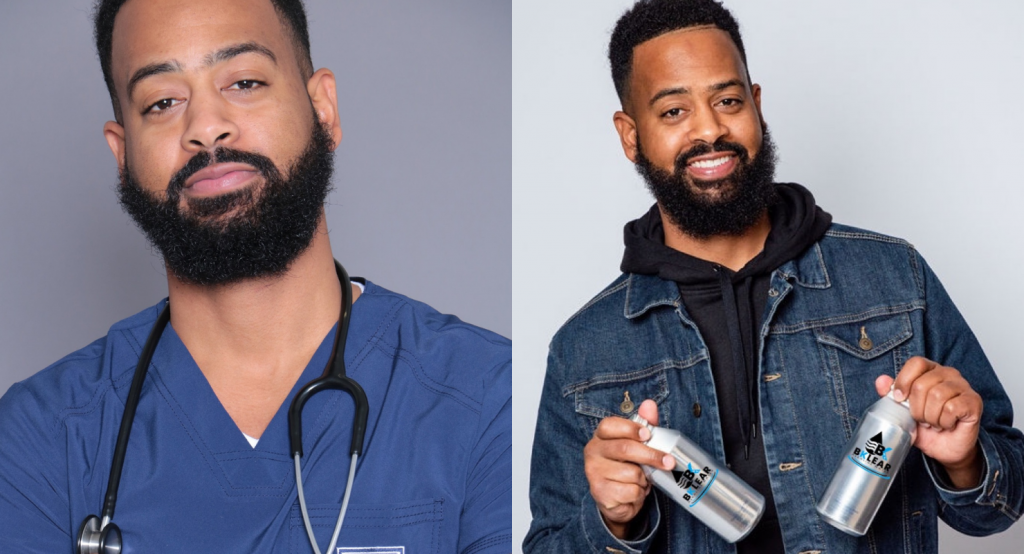Nurse Mahdi’s Family Inspired His Calling
Caring for his ailing grandmother made Muhammad Mahdi follow his mother into nursing.

Muhammad Mahdi, affectionately known as Nurse Mahdi, is a nurse and business owner Photos provided by Omniverse/NNS.
Muhammad Mahdi, affectionately known as Nurse Mahdi, has an unassuming demeanor at first glance. When he speaks, however, people listen.
He showed up a few minutes late to our meeting but had a good reason. His daughter had a doctor’s appointment, but he worked it out to have the appointment on FaceTime while he interviewed with me.
Nurse Mahdi is not what most people see when they picture a nurse. Male and Black. The majority of nurses are women and white.
Out of 2.82 million registered nurses in the United States, only 9.1% are men, and 9.9% identify as African American/non-Hispanic, according to 2019 data listed at Minority Nurse.
It was Mahdi’s mother who encouraged him to pursue a degree in engineering or nursing.
He shied away from his calling, at first spending time in the Air Force. He went to college in Texas and majored in education before answering the call to be a nurse.
His great-grandmother, who lived in St Louis, became the reason he went into health care.
She was diagnosed with dementia and declined rapidly. He drove from Milwaukee to St. Louis a couple times a week, 720-miles round trip. Among her caretakers, his grandmother responded only to him when it came to medications and eating.
“Me caring and showing compassion for someone is not a female emotion, it’s a human emotion,” Mahdi said.
Being with his great-grandmother “was a lot of responsibility because I didn’t know if what I was encouraging her to do was best for her health,” he said. “I made a vow to my great-grandmother that I was going to become a nurse while listening to a Beatles song, ‘I Want to Hold Your Hand.’”
He would sing the song to his great-grandmother whenever she became agitated. It was a song that was meaningful to her, and it would calm her down.
After her death, “there was a desire to reach my purpose and I always knew in some capacity I was to help those less fortunate. And ‘less fortunate’ doesn’t only mean material. It also means education and access. I just wanted to give us a fair shot when it came to health care. I feel this is where I needed to start.”
Nurse Mahdi would graduate as a registered nurse in 2015.
He quickly moved from the floor to management as assistant director of nursing at a Chicago-based hospital. However, the direction of management didn’t align with his purpose.
When the hospital refused to cover a $30 walker for a patient, Mahdi decided at that moment: He had done all he could do in management. He didn’t like how his community was viewed as income, and he refused to take part in that system.
He struck out on his own and created his own health care agency, where he does contract work and is able to focus on prevention and education.
From working with kids to help them transition back into the classrooms during COVID, to being able to persuade Black men to get their annual checkups and to be honest with their physicians about their health challenges, Nurse Mahdi is walking in his purpose.
He admits it’s a tough job, but one he is called to do. Of those in his profession he said, “Stop acting like you’re doing something just because you show up for work. If you’re not showing out at work, you ain’t doing a thing. If you jump in a profession to care for people, then care for them.”
‘Every being needs water’
His passion for health also led him to create BKlear, a water company, owned by Mahdi and his three children: two boys and one girl.
BKlear is alkaline water and sold through the website, at Sherman Phoenix and other select stores. Alkaline water is said to increase energy, improve metabolism and reduce bone loss.
He wants to leave a legacy to his children through creating a business they can be proud of and take over one day. He decided to start his business during COVID while he transitioned out of his management position.
It was just a matter of figuring out how to make the packaging a healthier option and picking out a logo. He chose aluminum for packaging instead of plastic because aluminum is reusable and recyclable and poses less of a health risk than plastic bottles.
The company, which started in September 2020, is beginning to make a national and global impact.
Mahdi was contacted by The Global Response Team, an organization that provides disaster relief services, to travel to Africa with the organization. The company googled Black-owned water suppliers and BKlear popped up.
In June of 2020, Nurse Mahdi traveled to Kenya and took his water with him. He provided nearly 500 bottles of water to African villages. He had customers stateside sign the bottles with inspirational messages.
While the business is still new and money isn’t as free-flowing as the water, Mahdi said, “I’m not chasing money. I’m chasing what I’m supposed to be chasing and the money is going to come.”
Mahdi, which means, “Rightly Guided,” takes another call from his daughter before we wrap up. “Daddy is going to pick you up soon,” he says before ending the call.
“I’m nursing the world, not necessarily by walking down a hall and I don’t always have to carry a stethoscope.”
Journeys: He’s Black. He’s a nurse. And he understands his assignment. was originally published by the Milwaukee Neighborhood News Service.





















